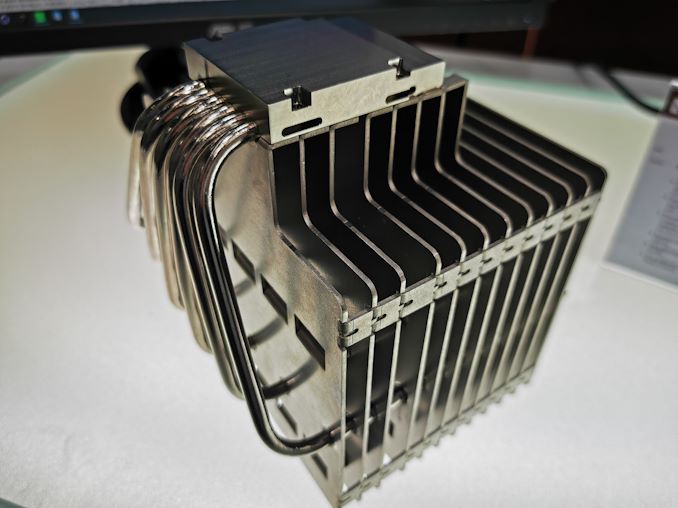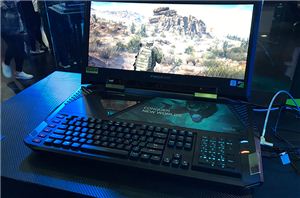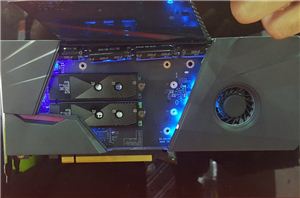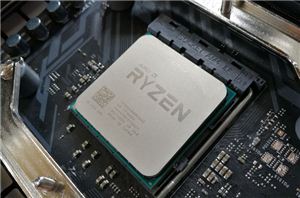Noctua Concept Fanless CPU Cooler: Up to 120W Of Cooling Performance
by Gavin Bonshor on June 6, 2019 8:00 AM EST
Noctua might have had a small booth showing off its products at Computex, but it had plenty to show for itself. On the booth was a new and conceptual design with a large aluminum tower heat sink weighing around 1.5 kg. This means processors drawing up to 120 W can be used while eliminating noise levels to zero.
Well known for its high-end air CPU cooling solutions and unique color theme, Noctua has designed a completely fanless CPU cooler with the capacity to handle CPU loads of up to 120 W. After speaking to Noctua about this concept design, they stated that the 120 W is guaranteed with this design providing the chassis has adequate convection, and plenty of breathing room. In tighter environments, the concept can stretch to 180 W with quiet chassis fans, or a fan directly placed onto the cooler. The bulk is made up of aluminum, with an asymmetrical design designed for better PCIe slot clearance, as well as being compatible with memorty on both Intel's LGA115X and AMD's AM4 chipsets.
On the booth was a test system demonstrating the concept, which currently has no name, while it was cooling an Intel Core i9-9900K on an ASUS Prime Z390-A motherboard running Prime95, inside a Jonsbo UM4 chassis. While the temperatures weren't exactly helped on by a warm Taiwanese climate, the Noctua fanless averaged a CPU core temperature of around 94 °C under a full Prime 95 load running all day. That's quite impressive given the Core i9-9900K is a premium processor, although the high temperature did thermally throttle the processor down.
While the Noctua Fanless CPU cooler is still completely conceptual, it's due to be completed and released some time in 2020.
| Want to keep up to date with all of our Computex 2019 Coverage? | ||||||
 Laptops |
 Hardware |
 Chips |
||||
| Follow AnandTech's breaking news here! | ||||||


















35 Comments
View All Comments
svan1971 - Thursday, June 6, 2019 - link
Perfect for cases without glass doors.svan1971 - Thursday, June 6, 2019 - link
and no doubt a few case fans would help.Metroid - Thursday, June 6, 2019 - link
Having only a single case fan ruins it, because noise is heard at the loudest and if a second fan is same noise as previous then will add a very negligible noise of 1% per fan, so 1 fan 30 db, second fan 30.3 db and so on, if a third fan is added, 40 db then the noise will be at the loudest, so 40db. Meaning adding any case fan will render this fanless design useless x noise. This fan is only good if no components inside the case generate large amount of heat, for this fan to work as supposed to, gpu and everything else needs to be passively cooled too. Noctua will have to create a gpu fanless design to accompany this.Metroid - Thursday, June 6, 2019 - link
A psu fanless design is needed too. Be quiet has them on sale. GPU fanless design will have to follow cpu fanless design, Also buying this for the 9900k is pointless, a 3700x will be perfect for this, 65 watts tdd and as high as 100 watts full load.Ideal GPU would be the ones with maximum of 75 watts given gpu fanless design follow this.
goatfajitas - Thursday, June 6, 2019 - link
They make some great quiet fans... Cant be heard at all, with a low airflow of course.samerakhras - Thursday, June 6, 2019 - link
passive cooled PC are not only for the low noise , they are for zero dust ..a True Passive PC should have ZERO FANS ... to eliminate the dust coming inside as well
goatfajitas - Thursday, June 6, 2019 - link
Agreed, if it's "passive" it cant have fans. I was just commenting on the usage case discussed above about a case fan and it's noise level. You can have 1 or 2 low flow quiet case fans that provide just a bit of air flow and no discernible noise.Metroid - Thursday, June 6, 2019 - link
I wonder if there is a way to seal the desktop case completely, no air in, no air out, that will truly eliminate the dust, I wonder of electronics survive in vacuum ambient."The biggest effect is that vacuum is a lousy conductor of heat. Spacecraft cabins (such as those of the Apollo Command Module or LEM) that must be evacuated must either be powered down during the event (as early Soviet capsules did) or must use fluid heat exchanges to carry away heat (as did Apollo).
If nothing is done, even the modest heat production of common electronics will quickly build up to damaging levels."
https://www.quora.com/What-is-the-effect-of-vacuum...
Metroid - Thursday, June 6, 2019 - link
You can vacuum your pc desktop with watercooling through a pipe, everything needs to be watercooled, radiator must be outside and a pipe connection to your pc, I used to do that.Showtime - Thursday, June 6, 2019 - link
A hot box/oven? Heat would have to escape through the case itself then, and that's not good.Fanless, this would work best in a perforated, or open case. It would take years for it to get dusty indoors unless there were air blowing on it (AC, open windows).